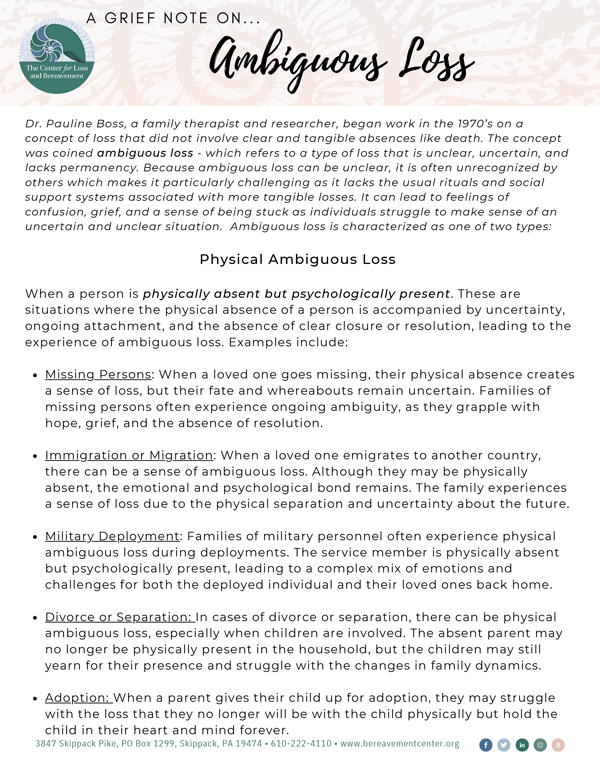CLB Grief Notes
A Grief Note On…
Ambiguous Loss
Dr. Pauline Boss, a family therapist and researcher, began work in the 1970’s on a concept of loss that did not involve clear and tangible absences like death. The concept was coined ambiguous loss – which refers to a type of loss that is unclear, uncertain, and lacks permanency. Because ambiguous loss can be unclear, it is often unrecognized by others which makes it particularly challenging as it lacks the usual rituals and social support systems associated with more tangible losses. It can lead to feelings of confusion, grief, and a sense of being stuck as individuals struggle to make sense of an uncertain and unclear situation. Ambiguous loss is characterized as one of two types:
Physical Ambiguous Loss
When a person is physically absent but psychologically present. These are situations where the physical absence of a person is accompanied by uncertainty, ongoing attachment, and the absence of clear closure or resolution, leading to the experience of ambiguous loss. Examples include:
Missing Persons: When a loved one goes missing, their physical absence creates a sense of loss, but their fate and whereabouts remain uncertain. Families of missing persons often experience ongoing ambiguity, as they grapple with hope, grief, and the absence of resolution.
Immigration or Migration: When a loved one emigrates to another country, there can be a sense of ambiguous loss. Although they may be physically absent, the emotional and psychological bond remains. The family experiences a sense of loss due to the physical separation and uncertainty about the future.
Military Deployment: Families of military personnel often experience physical ambiguous loss during deployments. The service member is physically absent but psychologically present, leading to a complex mix of emotions and challenges for both the deployed individual and their loved ones back home.
Divorce or Separation: In cases of divorce or separation, there can be physical ambiguous loss, especially when children are involved. The absent parent may no longer be physically present in the household, but the children may still yearn for their presence and struggle with the changes in family dynamics.
Adoption: When a parent gives their child up for adoption, they may struggle with the loss that they no longer will be with the child physically but hold the child in their heart and mind forever.
Abandonment: Those who have experienced abandonment by others often struggle with physical ambiguous loss. Though there is not a physical death, there is a physical disconnection with someone that is unsettling and unclear and lacks a sense of certainty because the person may or may not return.
Psychological Ambiguous Loss
When a person is psychologically absent but physically present. These are situations where the psychological or emotional presence of a person is ambiguous or altered, causing a sense of loss and grief for their previous state and the challenges of navigating the changed relationship. Examples include:
Severe Mental Illness: When a loved one experiences a severe mental illness such as schizophrenia, bipolar disorder, or severe depression, they may be physically present but psychologically absent. Their altered mental state can result in a loss of the person they once were, leaving family and friends grieving for the loss of the previous relationship and the challenges of interacting with their loved one’s changed behavior and capabilities.
Addiction: Individuals struggling with addiction may be physically present but psychologically absent due to their preoccupation with obtaining and using substances. Loved ones often experience a sense of loss as they witness the deterioration of the person’s well-being, personality, and relationships.
Emotional Distance or Estrangement: When there is a significant emotional distance or estrangement between family members or close relationships, psychological ambiguous loss can occur. The person may be physically present but emotionally unavailable, leading to a loss of emotional connection, intimacy, and a sense of belonging. This can occur in incidences whereby an individual is a workaholic.
Dementia: While a person with dementia is physically present, they experience cognitive and mood changes, along with memory loss that can affect their ability to engage in meaningful conversations and maintain emotional connections. Caregivers may struggle with connecting to their loved one, often feeling like they are caring for a stranger.
Traumatic Brain Injury: When a loved one experiences a traumatic brain injury (TBI), they may undergo significant personality and behavioral changes. While physically present, their psychological and emotional state may be altered, resulting in a loss of their previous identity and functioning. Family members and friends may grieve the loss of the person they knew before the injury.
Coping With Ambiguous Loss
Acknowledge, Validate Your Feelings: Recognize that your feelings of grief, confusion, and frustration are valid. Ambiguous loss can be emotionally taxing, so allow yourself to experience and express your emotions without judgment.
Seek Support: Reach out to family, friends, or support groups who can provide understanding and empathy. Sharing your experiences with others who have faced similar losses can help alleviate feelings of isolation and provide a sense of validation. If the emotional impact of ambiguous loss becomes overwhelming or interferes with your daily functioning, consider seeking professional help from a therapist or counselor experienced in grief and loss. They can provide guidance, support, and specialized techniques to help you navigate your unique situation.
Practice Self-Care: Engage in activities that promote your physical, mental, and emotional well-being. This can include exercise, maintaining a healthy lifestyle, practicing mindfulness techniques, and pursuing hobbies that bring you joy.
Establish Rituals or Symbolic Acts: Create personal rituals that provide a sense of closure or remembrance. This might involve setting aside time to honor the absent person (whether physically or emotionally absent), writing letters, creating a memory box, or engaging in rituals that hold personal meaning to you.
Adopt “Both-And” Thinking: Adopting the thought process that more than one experience can be true, such as “my loved one is both here, physically, and not here emotionally allows for a shift from “either-or” thinking, which can be limiting. “Both-and” thinking offers more options which can help individuals find meaning and hope within the situation.
Focus on What You Can Control: Recognize that there are aspects of the situation that are beyond your control. Instead, concentrate on the aspects of your life that you can take action on to provide a sense of empowerment and purpose.
Practice Acceptance, Patience, and Adaptation: Coming to terms with ambiguous loss involves accepting the changing nature of a relationship. Accept that ambiguity may be a long-term aspect of your situation. Embrace flexibility and resilience as you adapt to the changing circumstances and find new ways to redefine your relationship with the absent person or adjust to the absence.
https://www.apa.org/news/podcasts/speaking-of-psychology/ambiguous-loss
National Council on Family Relations Resource List on Ambiguous Loss
Join Our
Mailing List
Donate
Today
Request
Information

Affiliations
• NACG
• CBEM Changemaker
• ADEC
• Charity Navigator
Quick Links
About Us
Individual & Family Grief Counseling
Volunteer
News
Grief Support Resources
Contact
Ph: 610-222-4110
Fax: 610-222-4116
3847 Skippack Pike
P.O. Box 1299
Skippack, PA 19474
Support The Center For
Loss and Bereavement
